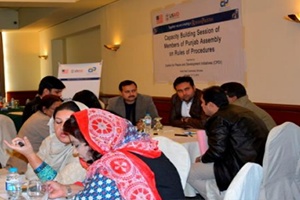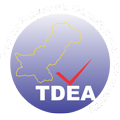USAID Citizens’ Voice Project, continuing with its long-term commitment to strengthening Pakistan’s legislative governance, supported an advocacy campaign that led to two amendments to the Rules of Procedure of the Provincial Assembly of the Punjab, 1997. The modifications will improve legislative governance in the province by bringing assembly proceedings in line with citizens’ needs.
In Pakistan, legislative governance remains weak and far below public expectations because of a wide range of factors. On the supply side, under-resourced legislative secretariats, limited capacity of legislators, lack of in-time legislative initiatives, and weak linkages between legislatures inhibit legislative governance in the country; on the demand side, the lack of public awareness regarding the roles and responsibilities of legislators, hinders citizens’ inclusion in the policymaking.

These challenges highlight the need to raise public awareness, build civil society’s capacity, carry out systematic oversight of legislators and legislatures, undertake advocacy initiatives for reforms in legislative governance, and strengthen linkages between citizens and legislators.
To meet these challenges for strengthening legislative governance in Pakistan, USAID Citizens’ Voice supported the Center for Peace and Development Initiatives (CPDI) to undertake an initiative to amend the Punjab Assembly’s Rules of Procedure to better cater to citizens’ needs.
To achieve the objective, CPDI facilitated the formation of a 40-member caucus of MPAs with representation from all the political parties in the Punjab Assembly. The caucus members met periodically to critically assess the Rules of Procedure and identify the gaps in them.
Following a six-month capacity-building and advocacy campaign, CPDI was able to nurture an active relationship with the legislators, leading to successful passage of two of its proposed amendments: (i) inclusion of zero hour; and (ii) announcement of annual assembly calendar.
The ‘zero hour’ amendment has opened up avenues to discuss those emerging issues that could not be highlighted given the packed legislative agenda. The ‘zero hour’, which has already come into practical use, is a milestone in strengthening legislative governance in Punjab. This is because it effectuates citizens’ voice to enhance the transparency, accountability, and responsiveness of elected representatives.
The second amendment, pertaining to the announcement of an annual assembly calendar at the start of the parliamentary year, will allow the MPAs to be informed about the schedule in advance, so that they could come well-prepared for assembly sessions. The amendment will also create an enabling environment for civil society to re-direct its efforts in accordance with the assembly’s agenda.
Some of the other amendments proposed by CPDI are also likely to be discussed and adopted in the upcoming sessions of the Punjab Assembly. These include introducing question hour of chief minister, empowering standing committees, installing biometrics system at the gates of the assembly to register attendance of the members, increasing time of question hour, and presenting the provincial budget in April instead of June.
Through initiatives aimed at strengthening legislative governance in Pakistan, USAID Citizens’ Voice Project is striving to empower the elected representatives and increase their capacity to carry out meaningful legislation for safeguarding citizens’ rights.




















